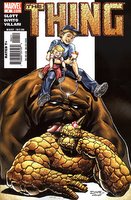 Dan Slott doesn't do that however. Looking at Thing #4, for example. When the Thing arrives home on page six, he encounters his friend and teammate the Invisible Woman handing him her youngest child to look after while she storms after her husband, Mr. Fantastic. She presently finds him tinkering with his equipment and she is enfuriated because their older child "lying in bed sick to his stomach!" Reed expresses surprise at how soon that happened, to which Sue resonds that, even though their son said his father was experimenting on him, she refused to believe it. Reed is left stammering to explain as we change scenes.
Dan Slott doesn't do that however. Looking at Thing #4, for example. When the Thing arrives home on page six, he encounters his friend and teammate the Invisible Woman handing him her youngest child to look after while she storms after her husband, Mr. Fantastic. She presently finds him tinkering with his equipment and she is enfuriated because their older child "lying in bed sick to his stomach!" Reed expresses surprise at how soon that happened, to which Sue resonds that, even though their son said his father was experimenting on him, she refused to believe it. Reed is left stammering to explain as we change scenes. We later learn that the equipment Reed was playing with was, in fact, a hologram. He explains that it was "an excuse to get Ben out of the house with the kids." The story continues by following Ben's day with his god-children, including the obligatory super villain. His god-son -- the one who was sick -- spends the entire day moping about until late in the evening, Ben asks what the problem is. The child explains that Reed's experiment on him was to give him $1,000 dollars and spend it as quickly as possible on himself, with the thinking being that the child would indulge in any number of frivolities. There's no surprise to learn that he does indeed spend the money on toys, comics, and candy. In relaying the story, he notes that "there's just so much candy I can eat before I get sick of it."
The beauty of it, in my mind, is that that the phrase "sick of it" is almost exclusively used as a metaphor and not meant to be taken literally. By switching that around and using the term in a more literal sense, it nicely ties back to the reasoning behind Susan's agitation early on. While the bait-and-switch tactic was employed more obviously with regard to the scientist conducting a social experiment instead of a stereotypical "hard science" one, the more nuanced approach with the child's sickness makes for a surprising little gem in the midst of what could have been a very straightforward story.
It's that type of attention to detail about Slott's writing that I really enjoy, and that's why I'm continuing to suggst that you tell your local shop dealer to have them pull The Thing for you every month.






0 comments:
Post a Comment